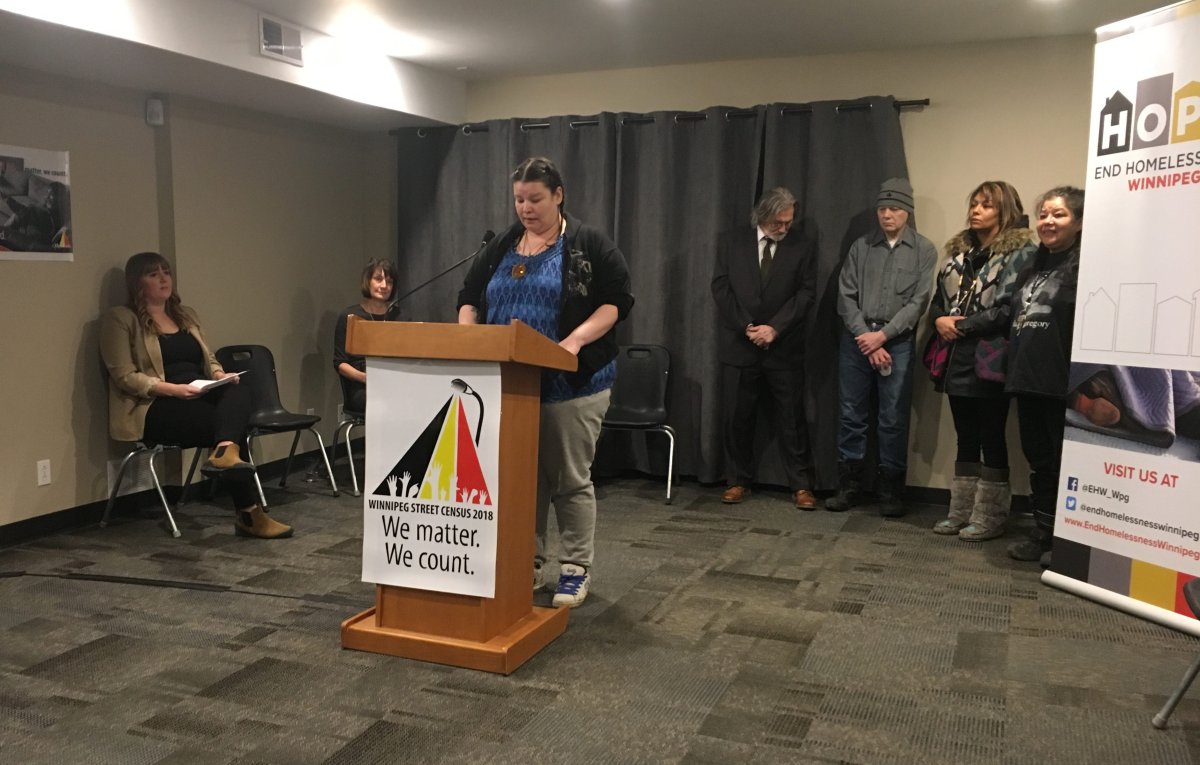Winnipeg’s second street census expects a number upwards of 1,400 when volunteers take to the streets this April to tally the city’s homeless population.

The first time the survey took place was Oct. 25, 2015, when roughly 300 people gave their time to help count the number of individuals without a stable place to live.
They found more than 1,400 people lived on the street and expect that number to rise this year, in part due to better surveying techniques.
“Because it’s only the second one, we’re probably going to see an increase and it will be hard to decide if that increase is because our methodology is better — because it will be better, because we learned a lot from the first one — or because the numbers have gone up,” Christina Maes Nino, with the Social Planning Council of Winnipeg, said.
Jolene Wilson said it will likely be a combination of both.
“[That number] has absolutely gone up,” she said.
She would know.
Wilson spent 15 years living on the streets of Winnipeg, and now works for the West Central Women’s Resource Centre.
She had been securely housed for a few years the last time the census took place, and said it’s a valuable way of learning more about the people who are homeless so resources can be better geared towards helping the vulnerable.
“It’s really, really, really important to me that we find a way to fill these gaps,” Wilson said. “I don’t believe that anybody should spend 15 years — I don’t believe that anybody should spend 15 minutes — without a home.”
For her, it was the West Central Women’s Resource Centre that pulled her out of homelessness.
“They saw things in me that I couldn’t see. And that often happens — we lose pieces of ourselves, very important pieces of ourselves, when we’re out there,” Wilson said.
“We have to hide those pieces in order to survive.”
“So going into West Central Women’s Resource Centre needing shampoo one day, somebody said ‘hey, you have a very great speaking voice and you have a story to tell, and we want to hear that story’. And ‘oh wow, now look at this skill and look at that skill’. They offered me programming and they offered me education and eventually offered me a job, so here I am today because of them.”
She said things could have turned out a lot worse, which is why she wants to take action now.
“On Wednesday, I took part in the tenth annual Missing and Murdered Indigenous Women and Girls March. I know that I could have easily been a face on one of those posters, rather than an advocate on the ground,” Wilson said.
She thinks it’s time to “stop hearing stories of people after they’re gone and start listening to those of the living, right here, right now.”
That’s what the census will be doing come April 18.
The initiative will receive $81,000 in government funding under the Homelessness Partnering Strategy. The City of Winnipeg will administer the census, with support provided by the Social Planning Council of Winnipeg along with more than 20 community partners.
Volunteers will spend 24 hours learning about Winnipeg’s homeless population to help with resource allocation.
According to Wilson, it’s this type of on-the-ground research that matters.
“If you haven’t experienced homelessness, you have absolutely no idea what it’s about, quite honestly,” she said. “It’s not enough to just go and spend a night on the street, because you’re sitting there and you know you have a bed to go home to. To me, that’s not enough — we need to listen to the voices that are out there. They need to be heard.”
It’s impossible to get the full picture of homelessness in Winnipeg, in part because some people hide to survive.
“One of the biggest challenges is we want to include folks who are experiencing hidden homelessness,” Maes Nino said. “We know invisibility is a survival strategy when people are homeless — being unseen is often really important for them. So we have to balance getting good data and people’s rights and dignity.”
“We know we’re missing folks and we have to be okay with that.”
Anyone wishing to volunteer for the street census can sign up online here.








Comments